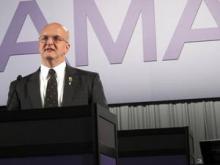CHICAGO – Delegates at the American Medical Association’s annual policymaking meeting spent nearly 3 hours on June 19 airing their opinions over whether individuals should be required to buy health insurance coverage.
The debate was a prelude to an expected vote in the next 2 days by the full House of Delegates. At issue: Whether the AMA should change the policy it adopted last year to support the so-called individual mandate, which is required in the Affordable Care Act.
With so much controversy over the mandate, including challenges making their way through the courts, several delegations put forward resolutions to revisit the AMA policy.
The AMA’s Council on Medical Service presented a report at the meeting that urged a continuation of the policy, saying that no viable alternative exists to ensure that most or all of Americans would some day be covered by health insurance.
Dr. Cecil Wilson, president of the AMA, reminded delegates that the organization’s decision to back a mandate was made in the mid-1990s, even before health reform was on the agenda. "During that intervening time there has been no additional evidence to suggest that we have another alternative," said Dr. Wilson, an internist from Winter Park, Fla. "I would suggest that our decision in the middle of the last decade was a good decision. I think the need to stay with it is even more so now," he said.
That viewed was echoed by delegations from the American College of Physicians and the American Academy of Family Physicians, which together led a group of 19 specialty and state medical societies in offering a resolution to affirm support of the individual mandate.
"Without a personal responsibility requirement, the most likely and plausible alternative to achieve coverage for everyone is government-run health care," said Dr. Yul Ejnes, chairman of the ACP Board of Regents.
Many of those speaking in front of the House of Delegates in favor of the individual mandate argued that without it the private health insurance market would collapse. And, they pointed out, the uninsured are sicker and die younger. Having insurance means better health care, said Dr. Roland Goertz, AAFP president. "As physicians, we should want better health care."
A resolution urging that purchase of health insurance be a personal responsibility, not a mandate, was offered by the American Academy of Facial Plastic and Reconstructive Surgery, the American Association of Neurological Surgeons, the American Society of General Surgeons, and state delegations from Kansas; Arkansas; Washington, D.C.; Florida; Georgia; and Oklahoma.
Those who supported that resolution said that the AMA should not be supporting a mandate of any kind. Some urged the AMA to stay neutral on the issue, at least until the court challenges were settled. Most said that a mandate took away individual freedom.
Dr. Jeff Terry of the Alabama delegation said that the AMA had always supported choice. "Mandates take away choice. A mandate takes away responsibility," said Dr. Terry. "Mandates dictate what type of insurance is appropriate. And mandates put more bureaucracy in the system because they must be enforced."
Dr. Joe Bailey, a member of the Georgia delegation said that having a mandate meant forcing someone to buy a product against their will.
"I’m truly ashamed with what we are trying to do with mandates in this country," he said.
Several opponents of the mandate suggested that states be allowed to experiment, as Massachusetts had, but that it not be a federal requirement.
Division over the AMA’s support of health reform has led to declining membership across the country. A representative of the Mississippi delegation said that AMA membership in the state dropped precipitously in the last 2 years, from 4,500 to about 600. He said most had left in protest over the AMA’s backing of the Affordable Care Act.


